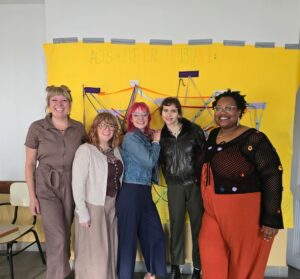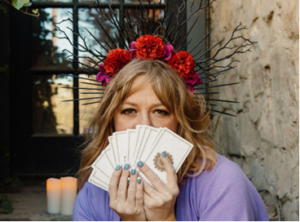Elena Degel and Sarah “Mosey” Brown are both students in Pacifica’s M.A./Ph.D. Program in Depth Psychology with Specialization in Community, Liberation, Indigenous, and Eco-Psychologies Program. They attended the 10th International Conference on Community Psychology at the University of the Republic in Uruguay. I’m delighted to speak with them about their experience.
Angela Borda: Thank you so much for meeting with me today, I know you have busy academic schedules. To begin, perhaps you could each introduce yourself to the Pacifica community at large, but letting us know a little about your background and what brought you to Pacifica and CLIE in particular?

Sarah “Mosey” Brown: I was a teacher for 15 years before I decided to return to school for my PhD. I was motivated to go back to school because I wanted to create change on a scale larger than just my classroom. I was drawn to CLIE through all of its lenses. Community, liberation, Indigenous and ecological work had all been important to my life and studies before I found Pacifica. It felt like a perfect fit.
Elena Degel: Because of my chronic illness, it took me about twice as long to complete my Bachelor’s degree. When I finally graduated in 2018, I had studied psychology but I had hesitations about pursuing a counseling licensure degree, so I started looking at some nontraditional options. I had really enjoyed studying philosophy and sociology and my minor in women and gender studies, and I wanted to learn more but also keep pursuing psychology. I had known of Pacifica but then I started looking into the CLIE program right before the Covid pandemic hit. After a year of much uncertainty, I decided to apply in 2021 and started that fall. It felt like the right time to enter this wholly unique program amongst so much social and political turmoil. The connections with and support from my cohort mates have carried me through and kept me in the program through the Master’s and beyond.
Angela: I understand that you were able to attend a conference in Uruguay this summer? Can you tell me what the conference was about and how you became interested in it?
Mosey: We became interested in this conference when a couple of our professors suggested that we generate a proposal for or attend the conference. Many of our professors participated in or presented in some way at the conference. Because of our CLIE focus, the theme of this conference was relevant to our studies and work with community at Pacifica.
Elena: It was the 10th International Conference of Community Psychology. In the U.S. there is a division of the APA called the Society for Community Research and Action which hosts biennial conferences domestically. This conference was kind of the international version of that, also held biennially around the world. This year it was hosted at the University of the Republic in Montevideo, Uruguay. The theme of the conference was “reinventar lo común,” or reinventing the commons and life together in the current socio-political context. The conference was held primarily in both Spanish and English languages. Contributions included working groups, workshops, and artistic-creative proposals presenting along the themes of emergent resistance, disputes for life, participatory methodologies, the role of the state in communal life, daily life, community health and care, expressions of violence, decolonial and feminist approaches to community psychology, and cognitive capitalism in the university context.
Angela: Uruguay is a long way to go for a conference! How did you manage that and was it your first time in South America?
Mosey: This was not my first time in South America. I have previously been to Argentina, Chile, Peru and Ecuador. This was a very long way to go for a conference and because of that we made arrangements to spend extra time in Uruguay and Argentina as tourists. We were all planning to pay our own way to the conference, but were able to secure very generous private funding.
Elena: This was my first time in South America and it was a long trek from Seattle. We planned all of our travel as a group of five students so we got to experience not only the conference together, but we also traveled and stayed in the same accommodations together. Upon returning, we also got a portion of our conference expenses reimbursed by the administration at Pacifica.
Angela: Did you present at the conference or how did you participate?
Mosey: We had been learning about everyday resistance and this idea resonated with a few of us who were interested in coming together to collaborate on this project. Because of the community nature of this conference, it was not set up as a typical colonial style conference with a large number of poster presentations. We decided that what best suited our interest was to propose a ‘working group’ session. For this we created a proposal around the topic of everyday resistance and then put out a call for others to join our working group. Each person who participated in the working group came up with a community oriented way to discuss some aspect of everyday resistance. The working group was then given a time slot during the conference and others could attend. We worked together as a large group to define everyday resistance, share stories of everyday resistance and we wove a tapestry that represented how everyday resistance showed up in our lives and we were able to see all of the interwoven patterns of everyday resistance.
Elena: I attended other working groups and co-presented with my classmates at the conference. My contribution to our group had to do with reimagining or queering temporality through what is referred to as “crip time,” and its connection to acts of everyday resistance.
Angela: What was your favorite part of the experience and how did it impact you in terms of your studies and research? Perhaps you can tell me what your main area of focus is within the CLIE program?
Mosey: My research is in youth everyday resistance at institutionalized schools, such as public schools. I think that many students are being labelled as problematic in the classroom, when in fact they are resisting violent institutional structures. I want to work with youth to understand their experience of everyday resistance, how this everyday resistance looks along lines of marginalization, and how their everyday resistance can be a transformative force. My favorite part of this conference was both being exposed to the wide range of ideas and research that are happening right now in our field and also meeting so many community psychologists from all over the world! It was really amazing to meet some of the scholars of research that has been foundational to my learning at Pacifica.
Elena: My main area of focus in the CLIE program has been around accessibility and disability justice. My favorite part of the experience was dynamic collaboration and connecting with international colleagues through our own working group and others that I/we attended that discussed decoloniality in the context of academic and community work. The convivality and relationship building among our group and with those we met there that occurred outside of conference hours, such as shared meal times, was a very valuable and important part of the experience for me. This experience also reminded me how important it is to maintain an international perspective and prioritize learning about and with international communities rather than continuously centering the United States (and the English language).
Angela: What has your experience of the CLIE program been? What do you most value in it?
Mosey: I think that the CLIE program has been life changing. It has been an opportunity for a great deal of unlearning and for seeing things from different vantage points. My cohort has been one of the most valuable parts of my education at Pacifica, and my exposure to their ways of thinking has been transformational. I value what we have communally created in our shared space. They have each shaped the journey I am now starting in my dissertation work.
Elena: The CLIE program has been impactful in ways that I could not have foreseen when I started the program. I have valued the range of instructors and topics presented that have shifted the way that I think about and move in the world. This program has also been an iterative process of unlearning oppressive ways of being and relating. I have had to navigate many tensions and contradictions, particularly among academia and liberatory praxis. What I have cherished the most, however, have been the relationships built amongst our cohort. I cannot imagine going through such a transformative journey with any other group of dreamers/scholars/badasses.
Angela: Thank you so much for speaking with me today and I look forward to all you will accomplish as you move into writing your dissertations.

Elena Degel (she/her) is from Seattle, Washington, which is located on the unceded ancestral lands of the Duwamish, Stillaguamish, Squamish, Muckleshoot, and Coast Salish peoples. Her academic background includes a Bachelor of Arts degree from Seattle University in psychology with a minor in women and gender studies. She then volunteered at one of the country’s original crisis hotlines, King County Crisis Connections, and has worked assisting a guardianship and trust law practice that serves primarily disabled clients. In the last couple of years she has also been a member of a local mutual care collective for disabled and chronically ill residents in the Seattle area. She is now a PhD candidate in Pacifica’s CLIE program, focusing on the phenomenological experiences at the intersections of gender, chronic illness, and necropolitics for women with Long Covid. When she is not reading or writing for school, she likes to spend time with her partner, cat, and dog, take walks near the Puget Sound, travel, and see live music and comedy.

Sarah Mosey Brown (she/they) is a dedicated educator and community advocate with extensive experience in both traditional and alternative educational settings. Based out of unceded Ute, Goshute and Eastern Shoshone territory (Salt Lake City), she has designed and implemented innovative curricula emphasizing social justice, cultural awareness, and activism, while mentoring fellow educators and guiding students through immersive cultural and wilderness experiences. Sarah holds advanced degrees in science education and environmental studies and is pursuing a PhD in Depth Psychology with a focus on community and liberation studies. Her career is distinguished by her passion for fostering inclusive and transformative educational opportunities. Her research extends into the idea of everyday resistance and how it shows up in institutionalized school settings. She is interested in how youth experience and define this resistance, how everyday resistance manifests intersectionality and how everyday resistance in school can be transformational.

Angela Wood is a writer for Pacifica Graduate Institute, as well as the editor of the Santa Barbara Literary Journal. Her work has been published in Food & Home, Peregrine, Hurricanes & Swan Songs, Delirium Corridor, Still Arts Quarterly, Danse Macabre, and is forthcoming in The Tertiary Lodger and Running Wild Anthology of Stories, Vol. 5.


